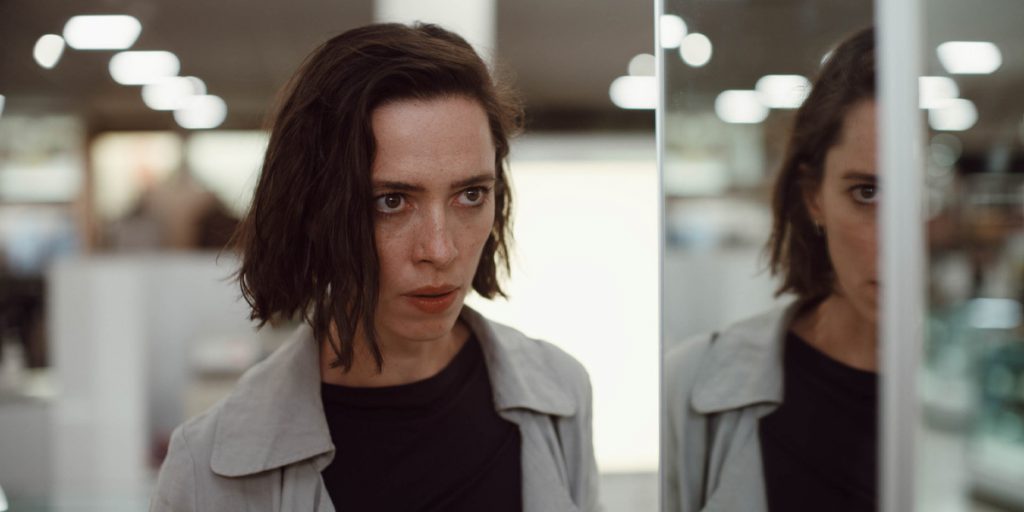This year’s Sundance film festival saw plenty of thrilling dramas and delightful comedies, but nothing like Resurrection ‘s unhinged exploration of motherhood.
Over the past decade, we’ve seen a rise in films focused on the topic of motherhood, sometimes through the lenses of the horror genre, that talk about the hardships of what it takes to raise your children and the responsibilities that come with them. Most recently, we saw Maggie Gyllenhaal’s amazing directorial debut The Lost Daughter, which explores this very topic and how the decisions you make as a parent can come back to haunt you. This early in the year, 2022’s Sundance film festival brings us yet another film discussing these themes with Andrew Semans’ Resurrection. After leading a successful and organized life where she has to balance the demands of her busy career and being a single parent to her daughter Abbie (Grace Kaufman, The Sky is Everywhere), Margaret (Rebecca Hall, The Night House) finds herself fighting off the demons of her past threatening to destroy her seemingly perfect life.
Resurrection presents itself as a relatively normal film following Margaret’s day-to-day life in its first act. We follow her daily routine, we see she might have a questionable sexual relationship with one of her co-workers, while she deeply cares about her daughter. She may be too caring, but it’s nothing out of the ordinary considering a lot of parents are overprotective nowadays. She constantly radiates an energy of being in control of everything and everyone around her professional and personal life, to the point that she is seen growing tired of having to listen to other people’s problems. It isn’t until a man from her mysterious past named David (Tim Roth, Sundown) comes back into her life that things start to get weird. Margaret begins to have nightmares hinting at what might have happened between her and David.
If there’s anything the film excels at is building tension and placing you in Margaret’s shoes, as she becomes more and more paranoid as the story finally begins to unfold in its second act. Director Andrew Semans does an amazing job at creating an anxiety inducing environment where you almost feel like you yourself are starting to lose your mind alongside our protagonist. Cinematographer Wyatt Garfield manages to compliment Semans’ sensitivities with these claustrophobic close-ups and extremely slow zoom-ins that you barely even notice the lenses are moving closer to the subjects, helping build the tension of a scene.
As much as Semans’ slow-burn approach to the film makes for an incredible psychological exploration of what a mother would do for her children, this is also the film’s biggest flaw. Resurrection’s second act has severe pacing issues, dragging quite a bit as Margaret spends the rest of the film wandering around once David comes into the picture, following him through the city and planning to get rid of him one way or another. It’s still engaging to see how Margaret’s relationship with Abbie is affected by her paranoia. Kaufman in many ways becomes the heart of the movie, as she clearly deeply cares about her mom’s mental state, but it’s not always enough to keep you engaged.

For years now, Rebecca Hall has proved herself time and time again why she’s one of the best and most underrated actresses working today. From her work in films such as The Gift to last year’s The Night House, she completely disappears in her roles, and her performance here is no exception. There is a point in Resurrection where she delivers a nearly 10 minute jaw-dropping monologue where you are glued to the screen while Hall’s acting skills shine. The anxiety in her body language, the stress in her eyes, and the tremendously dark and uncomfortable words coming out of her mouth as she explains what happened to her in the past, it all makes for what in my opinion should be considered her best performance to date. She is the sole reason why this movie works in the first place. Not to say the script isn’t fascinating enough, or that the technical side of the film isn’t impressive, because it is, but without Hall’s abilities to go up and beyond to show her character’s psyche, Resurrection would simply fall apart.
What will either make or break the film for many, I am sure, is the ending. I can only compare Resurrection’s finale to the likes of Titane’s ending: it is twisted, dark, full of desperation, resentment and an odd sense of validation. As mentioned, Hall is phenomenal, but the third act is where Tim Roth really comes into his own. Just by the way he speaks, his character is absolutely terrifying and you immediately understand why Margaret has been so worried about him throughout the film. There is a particular subplot involving David about cannibalism that comes into the surface towards Resurrection’s final moments that end up leaving more questions than answers. It all comes together in an unforgettable conclusion that will leave you thinking for days about what you just watched, for better or worse.
It’s safe to say Resurrection is not your typical drama following a woman in her struggles of being a mother. In a sense, it’s one of those “descend into madness” kind of movies that really works for the majority of the film’s runtime, and not so much in others. For what it’s worth, though, it is so unapologetically weird and confident in its own themes that you can’t help but respect what it’s going for. Will Resurrection manage to keep the conversation going and grab audiences’ attention once it gets a proper release? Who’s to say, but I can’t wait to see how people react to this unsettling exploration of motherhood paired with Rebecca Hall’s unhinged Oscar-worthy performance.
Resurrection is now available to watch on digital and on demand.

